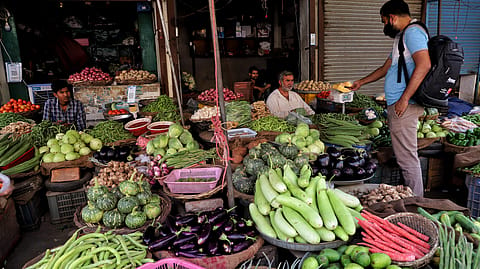RBI’s report on inflation can’t be made public: FinMin
Average inflation has remained above RBI’s upper tolerance level — i.e. 6% – for all 3 consecutive quarters in Jan-Sep 2022.

The finance ministry has said the Reserve Bank’s (RBI) report on reasons behind inflation remaining beyond its tolerance band for several months can’t be revealed as regulations do not provide for "making the report public". The ministry’s response comes as the average inflation has remained above the upper tolerance level — i.e. 6% – for all 3 consecutive quarters in January-September 2022.
Minister of state in the finance ministry, Pankaj Chaudhary, said in the Lok Sabha today that soaring commodity prices at the international level and pandemic-induced supply-demand imbalances have caused a rise in the inflation rate worldwide, including in India.
He said the Russia-Ukraine conflict has exacerbated the inflationary pressures in crude oil, gas, metals and edible oils. The onset of heat waves and uneven rainfall in the later part of the monsoon season also led to crop damage and a rise in vegetable prices, he said.
The minister replied to a question on whether the government has taken note of the fact that the rising retail inflation rate in India is affecting its economy.
The data shared by the minister showed headline inflation rising from 3.59% in FY18 to 5.51% in FY22. In this fiscal so far, the retail inflation rose to a new high of 7.79% in April, 7.04% in May, 7.01% in June, 6.71% in July, 7% in August, 7.41% in September and 6.77% in October. The retail inflation rates for the three quarters of 2022 stood at 6.3% in Jan-March; 7.3% in April-June; and 7% in July-September. The government will make the retail inflation data for November public today at 5.30 pm.
Recommended Stories
The minister said to curtail inflation, the Centre has taken measures including a reduction in excise duty by ₹8 per litre on petrol and ₹6 per litre on diesel on May 21, 2022, prohibition of the export of wheat products, imposition of export duty on rice, reduction in import duties and cess on pulses, rationalisation of tariffs and imposition of stock limits on edible oils and oil seeds, maintenance of buffer stock for onion and pulses, the inclusion of soya meal as an essential commodity in the schedule of the Essential Commodities Act, 1955 and imposition of a stock limit on soya meal.
Some other measures that were especially directed towards the common man were the Targeted Public Distribution System under the National Food Security Act, 2013 (NFSA), Pradhan Mantri Garib Kalyan Anna Yojana (PMGKAY), and One Nation One Ration Card (ONORC) scheme.
(INR CR)
The minister said the RBI has also submitted the mandatory explanation regarding the reasons for missing the inflation targets to the government. He said the said provisions of the RBI Act, 1934, and regulations do not provide for "making the report public".
On the decline in foreign exchange reserves, the minister said India's foreign exchange reserves declined by $74.65 billion to $532.66 billion as on September 30, 2022. The country's foreign exchange reserves stood at $607.31 billion as of March 31, 2022.
As per the ministry, the exchange rate of the rupee is market-determined. INR's depreciation stands at about 6.9% in the current financial year till November 30, 2022. Among the emerging market peer currencies, the rupee movement has been relatively "stable", he said, adding that it performed better than most Asian peer currencies, including the Chinese Renminbi (10.6%), Indonesian Rupiah (8.7%), Philippine Peso (8.5%), South Korean Won (8.1%), Taiwanese Dollar (7.3%) in this financial year. The rupee has also performed better than the Turkish Lira (21.2%), South African Rand (15.1%) and Brazilian Real (8.7%).